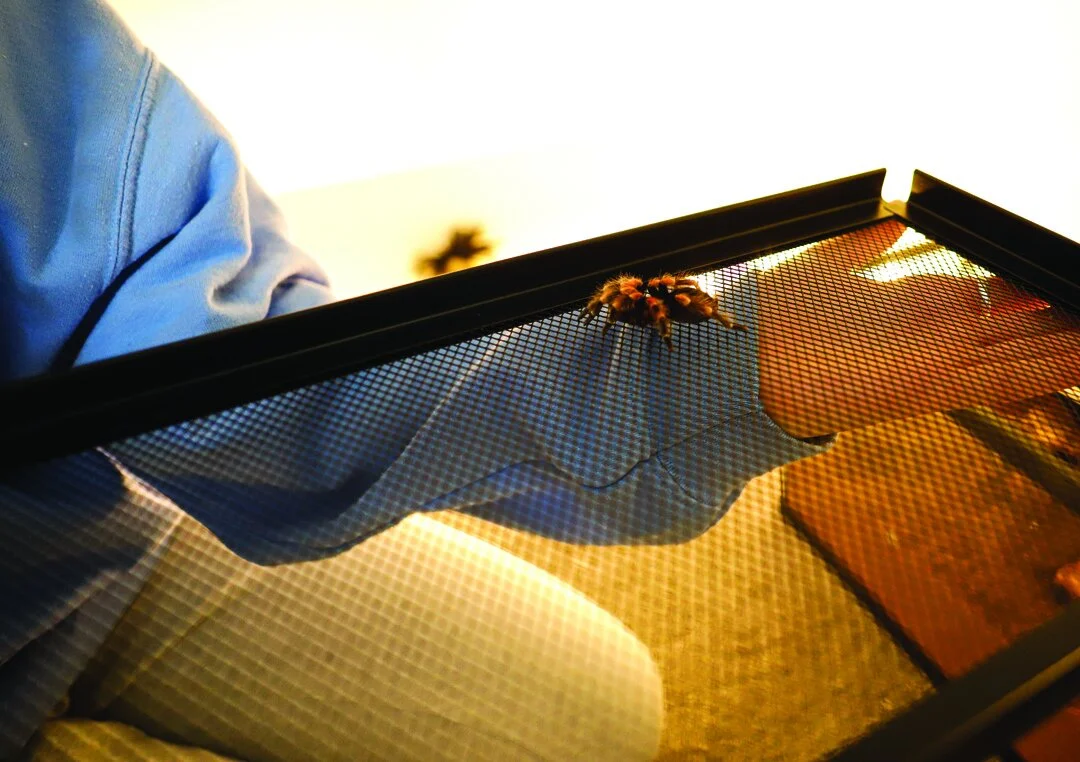Bettas, and Spider, and Snails...Oh my!
Story by Katrina Carlson
Photos by Ellie Habel
Nowadays, it seems like the most popular pets are the most peculiar.
Mitchell Smith is a senior at Ohio University majoring in wildlife and conservation biology and has owned his pet snail Shelldon for a year and a half. Smith says that his admiration of snails helped him narrow down his major choice while at college.
Nobody bats an eye at the sight of a dog strolling around College Green. Social media are filled with cute photos of Ohio University cats such as Pumpkin. These fluffy friends are not alone on campus, however. Some students embrace abnormality and adopt pets that are a little less likely to be seen around town.
“A wild or exotic animal is one that does not belong to one of seven domesticated species: dogs, cats, horses, pigs, cows, sheep or goats,” according to American Humane. Under these guidelines, exotic pets are more common than most may think.
Mitchell Smith, a senior studying wildlife and conservation biology, owns a giant African land snail named Shelldon. While some may not consider such a common outdoor animal to be good grounds for a pet, Smith finds snails captivating.
“I just think they’re so much different than other animals,” Smith says. “They just fascinated me. Since high school, I found some snails and I just had to keep them as pets … [It’s been] kind of a snowball effect for the past few years.”
Smith’s interest in snails has been helpful in his academic journey at OU. Owning a snail has helped him understand his major more deeply by putting to practice what he has studied.
“I think it’s helped me, in a way, to focus on certain aspects of school and definitely within my specific major … It’s one thing to read a textbook and to learn, but then it’s another thing to actually have an animal to take care of,” Smith says.
Shelldon has lived with Smith and his roommates for more than a year. Some of the snail’s favorite activities include munching on blueberries and carrots, climbing up walls and acting, Smith says. Shelldon is the star of Smith’s YouTube channel dedicated to educating viewers on the wonders and intricacies of snails.
“The channel is called Slug Master Studios and Shelldon is featured in it; he’s quite a good actor if you ask me,” Smith says. “Basically, I try to make short videos that revolve around Shelldon or snails in general to talk about them and give different fun facts and what snails might be thinking.”
Pictured is Shelldon, a giant African Land snail owned by Ohio University student Mitchell Smith.
Those who are curious in learning more about snails should visit Smith’s YouTube channel. While many have never considered it before, they may start thinking about a snail as a pet.
Another owner of an untraditional pet is Emma Mathy, a freshman studying psychology, who has a blue crowntail betta fish with an interesting history. Mathy obtained their fish, Tank Jamison, by rehoming him from improper conditions before moving into their college dorm.
Like other fish, crowntail betta fish have specific tank requirements that ensure their health and well-being. According to Fishkeeping World, monitoring the fish’s water temperature is important because “it will ensure the betta’s metabolism is correct.”
After taking in Tank, Mathy set him up with a water heater, filter and natural plants, which provide him with sufficient enrichment and stimulation. Mathy takes great care in providing for Tank and has noticed improvement in the health and activity of their fish.
“He’s gotten here and gotten healthier,” Mathy says. “He’s gotten darker colors because fish tend to lose pigment when they’re stressed out, so because his basic needs are being met now, he is a more colorful and lively [fish].”
The benefits of owning a fish, as Mathy describes them, are the relaxing feelings they get from watching Tank, as well as the feeling of accomplishment they get from properly taking care of their pet.
Mathy encourages other OU students to adopt their own fish.
“Definitely get a fish in college,” Mathy says. “Betta fish are super easy to take care of once you understand how to take care of them, and they’re just cute.”
Julia Miller, a junior studying media arts production, was looking into fish adoption, but changed her mind when she saw an available tarantula. Although most people would not dare to choose an arachnid as a pet, Miller feels quite the opposite toward her eight-legged friend.
Spiders are known to be the source of fear for many individuals. Miller says that there were mixed reactions from her roommates after she brought home her tarantula, Lady Di.
Julia Miller was originally planing to purchase a fish but instead came home with tarantula, Lady Di. Miller says that caring for Lady Di has increased her ability to take care for another being.
“One of my roommates was happy that I got one, and the other one, I still think that she is upset with me for it, but she’s [mostly] gotten over it,” Miller says.
Regarding the stigma around spiders, Miller responds by saying that they are typically more scared of humans than humans are of them, and spiders are not as aggressive as people believe.
“They need love too,” Miller says. “They have their own personalities.”
Miller describes Lady Di as being quite shy, which she says is typical for many tarantulas. Miller explains their relationship as more co-existent than anything; Lady Di does not prefer being touched very much. Instead, Miller enjoys watching her in her enclosure.
Pictured is Lady Di, a tarantula owned by Ohio University student Julia Miller. Miller describes Lady Di as quite shy and that she doesn't prefer to be touched very much.
One aspect of owning a pet in college that Miller has found favorable is the increased responsibility it takes to care for another being, which she says has been helpful in getting her ready for real world situations.
While these pets may not be seen walking down the street, they are still a prevalent part of students’ lives on campus. Many people may see these pets as strange but to these students, they provide the same companionship as any other animal.




